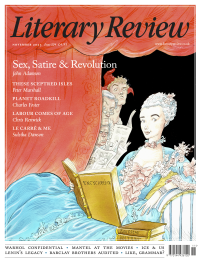Joan Smith
Oops!… He Did It Again
Toxic: Women, Fame and the Noughties
By Sarah Ditum
Fleet 352pp £22
Almost twenty years ago, there was a furore over the exposure of one of Janet Jackson’s breasts at a performance with Justin Timberlake during the interval of the Super Bowl. It happened when a choreographed sequence involving the two singers went wrong, turning Timberlake’s playful grab at Jackson’s bustier into what would be described as a ‘wardrobe malfunction’. Apparently Jackson was wearing ‘a sunburst-shaped nipple shield’, so it was not even as though the audience got to see her nipple, but the photograph of the moment became ‘the most searched-for image in net history’. The incident broke the record for the most searches in a twenty-four-hour period, which had previously been held by the 9/11 terrorist attacks.
Sarah Ditum’s account of the reaction to this event made me wonder whether anything else was going on in 2004. It barely registers in my recollection of that year, which featured a presidential election and recriminations about the involvement of the USA and the UK in a disastrous war in Iraq. Ditum explains its impact on Jackson’s career at some length, however, arguing that it ‘left Janet irrevocably diminished’. It is one of many examples cited to support her thesis, which is that ‘the noughties’ – a period she defines as beginning in 1998 and ending in 2013 – were a ‘monstrous time to be famous and female’. She describes the era as the ‘Upskirt Decade’, when the arrival of websites with an appetite for scurrilous gossip about celebrities created a market for snatched pictures of women’s underwear and genitalia.
Women like Britney Spears and Paris Hilton were photographed scrambling in and out of taxis, becoming objects of envy and gloating disapproval at the same time. Ditum’s analysis of Spears’s appeal to teenage girls is informed by her own experiences as a fan: she taped a photograph of

Sign Up to our newsletter
Receive free articles, highlights from the archive, news, details of prizes, and much more.@Lit_Review
Follow Literary Review on Twitter
Twitter Feed
'A charming and amusing personal history'
Don't miss this brilliant @Lit_Review review of #WorldCupFever 👇
@KuperSimon's must-read footballing journey in nine tournaments is out now ⚽️🏆
Michael Taylor - The Beautiful Game
Michael Taylor: The Beautiful Game - World Cup Fever: A Footballing Journey in Nine Tournaments by Simon Kuper; Th...
literaryreview.co.uk
In the summer of 1918, the Caspian port of Baku played host to a remarkable group of Allied soldiers, sent to defend oil wells against the Ottomans.
Anna Reid recounts their escapades.
Anna Reid - Mission Impossible
Anna Reid: Mission Impossible - Mavericks: Empire, Oil, Revolution and the Forgotten Battle of World War One by Nick Higham
literaryreview.co.uk
Alfred, Lord Tennyson is practically a byword for old-fashioned Victorian grandeur, rarely pictured without a cravat and a serious beard.
Seamus Perry tries to picture him as a younger man.
Seamus Perry - Before the Beard
Seamus Perry: Before the Beard - The Boundless Deep: Young Tennyson, Science, and the Crisis of Belief by Richard Holmes
literaryreview.co.uk